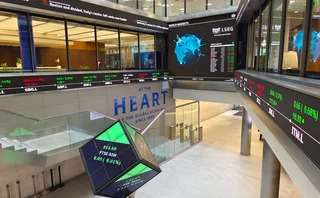
RMB house of the year: Deutsche Bank
Asia Risk Awards 2019

As China continues to open up its capital markets to global investors beyond bonds and stocks and into derivatives and money markets, banks are racing against each other to offer market-access solutions to attract clients and grab market share.
Deutsche Bank has recently been grappling with a global restructuring plan as it seeks to turn around its fortunes and, in July, got rid of 18,000 staff as it pulled out of the equities sales and trading business.
But its RMB franchise remains very a much core pillar of the bank’s Asia-Pacific strategy; the “strongest in the region, if not globally”, says the bank. Its clients also praise the broad-based product capabilities, regulatory relationship and innovative structuring capability that the bank offers in the country.
Deutsche Bank has been operating in China since 1872. It has a full onshore presence in the country, with operations across capital markets, financing, forex and rates, dealing with both institutions and corporates aligned with transaction banking. Two initiatives from last year stand out in particular and have prompted the bank’s main competitors to follow suit: a hub-and-spoke model whereby firms can trade the RMB from any branch, and a centralised hedging strategy.
“We go out to meet and solve client problems, which is what drives business,” says Jerry Li, head of Greater China local markets. Li says there has been particularly strong demand this year for sophisticated cross-border products that require advanced structuring capabilities “to meet not just client needs but also regulatory requirements, especially in light of the opening up of the Chinese market”.
Beyond these two solutions, the bank’s prowess is visible across the spectrum including coming up with products quickly to tap market moves. Deutsche Bank is one of two top international banks, measured across metrics such as trading volume, number of tickets and client trading via Bond Connect, which allows foreigners to tap into the fixed-income market without first obtaining an onshore licence.
The bank serves more than 180 global institutions for Bond Connect across Asia, Australia, Europe and the Americas, and its China access solutions outside of the Bond Connect platform continues to expand.
“For instance, we are the first and probably only bank to offer clients access to tradable prices on China onshore bonds outside of China trading hours,” says Li. “Utilising our US and Europe, Middle East and Africa-based Asia trading hubs, this truly brings our global client base to China.”
The bank also offered offshore RMB cross-currency swaps for Chinese conglomerates, a cancellable call spread cross-currency swap and cross-border receivables financing for a Chinese state-owned enterprise during the year.
Between January and July, the volumes of RMB cross-currency swaps that Deutsche Bank was doing grew tenfold compared with the same period in 2018, as clients took advantage of the flat US dollar offshore swap curve in order to hedge dollar-debt exposures against local currency income.
We are the first and probably only bank to offer clients access to tradable prices on China onshore bonds outside of China trading hours. Utilising our US and Europe, Middle East and Africa-based Asia trading hubs, this truly brings our global client base to China
Jerry Li, Deutsche Bank
Deutsche Bank has a market share of 15% and daily transaction volume of $100 million in the offshore RMB cross-currency swaps market.
Apart from offering the major currencies against CNH, the bank’s pricing capability now extends to local currencies, such as Hong Kong dollar and Malaysian ringgit, with the goal to provide a balance sheet hedging tool for Chinese clients within the One Belt, One Road initiative.
The bank also executed the first 10-year tenor cross-currency swap in the market.
Besides the typical structured products such as total return swaps, bond forwards and index-linked notes, Deutsche Bank also introduced a model portfolio to ease client access. This consists of a portfolio of onshore China cash bonds, selected by Deutsche Bank to replicate the Bloomberg Barclays China Treasury, as well as the policy bank index (the reference index). Tracking error is kept to a minimum.
By investing in the model portfolio, investors can achieve returns that track the reference China bond index by holding a portfolio of 12 bonds. Compared to the reference index, the model portfolio offers several benefits, including a reduction in overall implementation cost and transparent reporting and analysis. Since the synthetic note can settle in the greenback or offshore RMB, clients do not need to set up pipes and connections to Bond Connect or other access channels.
Hub-and-spoke
Li says Deutsche Bank is now “probably the biggest provider of cross-border solutions”.
One of the bank’s flagship offerings this year has been an onshore RMB hub-and-spoke model.
“We proposed the idea to the People’s Bank of China and they agreed, as it was an avenue to accelerate the internationalisation of the currency,” says Li.
Under the model, which was first proposed to the People’s Bank of China (PBoC) in June and finalised in September 2018, the bank’s global branches will “become an extension of its China branch and act as the spokes”, says Li.
As a result, clients could use their existing account structure with the bank to undertake cross-border RMB transactions, removing arduous onboarding processes.
The bank developed the hub-and-spoke model over many months of consultation with the PBoC, says Li. This facility alone increased the number of clients for whom the bank could provide onshore RMB services by a factor of more than 100.
The bank was also the first to obtain the PBoC approval for centralised hedging corporate treasury models. This has enabled it to work with its corporate clients to consolidate all offshore subsidiaries into a single unit in order to transact in the RMB. It significantly streamlines internal processes for the bank’s clients, removing the requirement to open multiple cash accounts across the bank’s subsidiary network.
This is the first, and to date only, centralised hedging corporate model approved in the market. This solution taps into the significant dislocations between the onshore and offshore RMB markets. Its corporate clients have the advantage of being able to use the most favourable market at any given point in time, thereby enjoying significant savings and enhancing their global risk-management policies.
An executive at one of Deutsche Bank’s clients welcomes the fact that this solution now allows him to hedge in the most favourable market conditions, depending on where rates are.
This solution has already been applied, among other underlying items, for new or existing inter-company loans to the China subsidiary, the executive says. It helped the client reduce the costs of hedging notably while gaining additional flexibility on market liquidity.
The client says his corporation has saved a “significant amount” from this solution and has been able to seamlessly switch between the onshore and offshore markets to tap the best rate and liquidity available. While the company currently uses the service only for inter-company loans, it is working with Deutsche Bank to deploy it on payments based on receivables and other RMB transactions too.
“We are only in stage one of this solution,” says the executive. “Once we succeed in expanding it to other hedging, I expect the savings to enhance even further.”
The executive also says Deutsche Bank was the first, and so far only, bank to come up with such an offering.
Cancellable call spread
Another client lauded the bank’s long-tenor US dollar-offshore RMB cancellable call spread cross-currency swap. Deutsche Bank executed the longest offshore RMB exotic option with a leading Chinese developer on the back of greenback bond hedging.
With corporates’ continuing demand to extend debt duration, Deutsche Bank provided the liquidity in the long-tenor CNH option market to match the hedging with bond maturity. The six-year USD/CNH cancellable call spread cross-currency swap allowed the Chinese corporate to monetise the current low volatility and skew to manage their US dollar exposure in a cost-efficient manner.
The embedded cancel option has been particularly valuable in providing clients with the flexibility to protect themselves against a weakening in the CNH, thus reducing costs in the event of a market reversal.
“Deutsche Bank were the only ones to give us the cancel option,” says an official at the developer. “That enhances our flexibility, allows us to synchronise with market moves, better fund the balance sheet and call the debt if required without any fear of losing on the hedge.”
The executive was also pleased with the comparatively long tenor of the swap.
Deutsche bank expects the onus on cross-border products to continue as the pace of RMB internationalisation continues and the trade war between the US and China escalates.
“Currency is one of the tools in the trade war,” says Li. “The regulator is really friendly when it comes to cross-border products. I think the regulator would be happier for pricing discovery to be onshore instead of offshore.”
The bank expects cross-border products to dominate in areas such as hedging for inter-company loans, receivable, forward fixing for dividends and bond investment.
“We do see a large amount of growth in terms of activity we are undertaking with clients,” says Li. “As an RMB bank we can’t restrict to offshore or onshore. The key is to be a full-fledged cross-border solution provider. Clients are asking for products, such as complex cross-currency swaps. This requires handholding in terms of the legal framework and connecting with regulators.”
Only users who have a paid subscription or are part of a corporate subscription are able to print or copy content.
To access these options, along with all other subscription benefits, please contact info@risk.net or view our subscription options here: http://subscriptions.risk.net/subscribe
You are currently unable to print this content. Please contact info@risk.net to find out more.
You are currently unable to copy this content. Please contact info@risk.net to find out more.
Copyright Infopro Digital Limited. All rights reserved.
As outlined in our terms and conditions, https://www.infopro-digital.com/terms-and-conditions/subscriptions/ (point 2.4), printing is limited to a single copy.
If you would like to purchase additional rights please email info@risk.net
Copyright Infopro Digital Limited. All rights reserved.
You may share this content using our article tools. As outlined in our terms and conditions, https://www.infopro-digital.com/terms-and-conditions/subscriptions/ (clause 2.4), an Authorised User may only make one copy of the materials for their own personal use. You must also comply with the restrictions in clause 2.5.
If you would like to purchase additional rights please email info@risk.net
More on Awards
Clearing house of the year: LCH
Risk Awards 2025: LCH outshines rivals in its commitment to innovation and co-operation with clearing members
Best use of machine learning/AI: CompatibL
CompatibL’s groundbreaking use of LLMs for automated trade entry earned the Best use of machine learning/AI award at the 2025 Risk Markets Technology Awards, redefining speed and reliability in what-if analytics
Markets Technology Awards 2025 winners’ review
Vendors jockeying for position in this year’s MTAs, as banks and regulators take aim at counterparty blind spots
Equity derivatives house of the year: Bank of America
Risk Awards 2025: Bank gains plaudits – and profits – with enhanced product range, including new variants of short-vol structures and equity dispersion
Law firm of the year: Linklaters
Risk Awards 2025: Law firm’s work helped buttress markets for credit derivatives, clearing and digital assets
Derivatives house of the year: UBS
Risk Awards 2025: Mega-merger expected to add $1 billion to markets revenues, via 30 integration projects
Interest rate derivatives house of the year: JP Morgan
Risk Awards 2025: Steepener hedges and Spire novations helped clients navigate shifting rates regime
Currency derivatives house of the year: UBS
Risk Awards 2025: Access to wealth management client base helped Swiss bank to recycle volatility and provide accurate pricing for a range of FX structures







